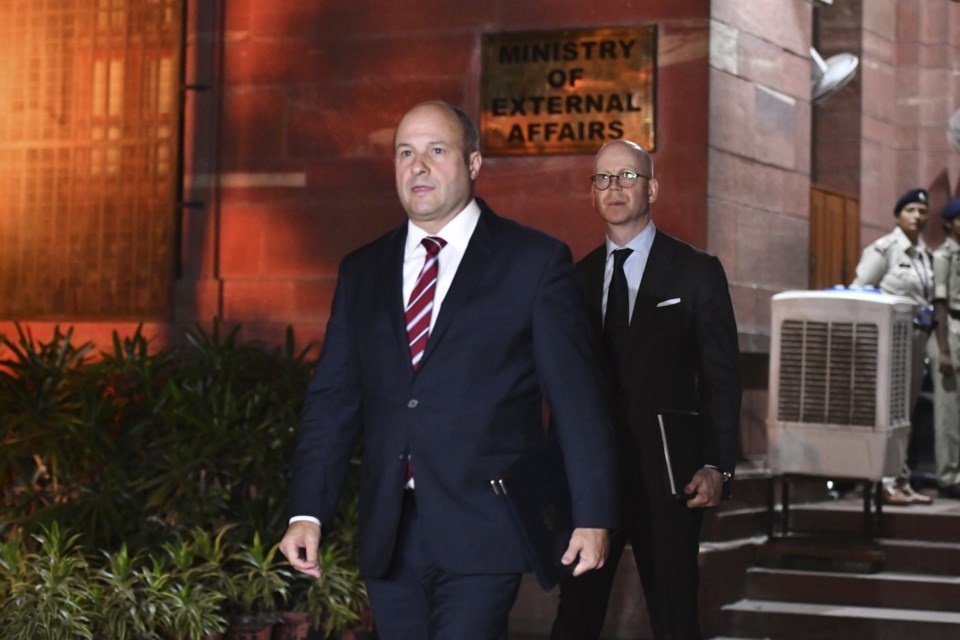TORONTO (AP) — Canada said it has identified India’s top diplomat in the country as a person of interest in the assassination of a Sikh activist there and expelled him and five other diplomats Monday, in an escalating dispute over the June 2023 killing and allegations of other crimes.
Prime Minister Justin Trudeau said Canada was expelling the Indian high commissioner and the others — all persons of interest, as Canada's foreign minister said police had uncovered evidence of a worsening campaign against Canadian citizens by agents of the Indian government.
“We will never tolerate the involvement of a foreign government threatening and killing Canadian citizens on Canadian soil," Trudeau said. He alleged that diplomats were collecting information about Canadians and passing it on to organized crime to attack Canadians, and said “India has made a monumental mistake."
India has rejected the accusations as absurd.
India's foreign ministry in turn said it was expelling Canada's acting high commissioner and five other diplomats, adding that they were told to leave by the end of Saturday.
Trudeau said last year there were credible allegations that India’s government had links to the assassination in Canada of Sikh activist Hardeep Singh Nijjar.
Canada's foreign minister, Mélanie Joly, said the Royal Canadian Mounted Police had gathered “ample, clear and concrete evidence which identified six individuals as persons of interest in the Nijjar case.”
She said India was asked to waive diplomatic and consular immunity and cooperate in the investigation but refused. She asked that India's government support the ongoing investigation “as it remains in both our countries’ interest to get to the bottom of this.”
She noted that violence “actually increased” following the allegations a year ago.
RCMP Mike Duheme said police have evidence allegedly tying Indian government agents to other homicides and violent acts in Canada.
“The team has learned a significant amount of information about the breadth and depth of criminal activity orchestrated by agents of the government of India, and consequential threats to the safety and security of Canadians and individuals living in Canada,” he said.
Duheme declined to provide specifics, citing ongoing investigations, but he said there have been well over a dozen credible and imminent threats that have resulted in police warning members of the South Asian community, notably the pro-Khalistan, or Sikh independence, movement. He said attempts to have discussions with Indian law enforcement were unsuccessful.
Nijjar, 45, was fatally shot in his pickup truck after he left the Sikh temple he led in Surrey, British Columbia. An Indian-born citizen of Canada, he owned a plumbing business and was a leader in what remains of a once-strong movement to create an independent Sikh homeland.
Four Indian nationals living in Canada were charged with Niijar's murder.
India designated Nijjar a terrorist in 2020, and at the time of his death had been seeking his arrest for alleged involvement in an attack on a Hindu priest.
India has repeatedly criticized Trudeau's government for being soft on supporters of the Khalistan movement who live in Canada. The Khalistan movement is banned in India but has support among the Sikh diaspora, particularly in Canada.
India has been asking countries like Canada, Australia and the U.K. to take legal action against Sikh activists. India has particularly raised these concerns with Canada, where Sikhs make up nearly 2% of the country’s population.
In response to Canada’s earlier allegations, India told Canada last year to remove 41 of its 62 diplomats in the country. Relations between the countries have been frosty since then.
The Indian foreign ministry said Monday that “India reserves the right to take further steps in response to the Trudeau government’s support for extremism, violence and separatism against India.”
The ministry also summoned Canada's top diplomat in New Delhi and told him that “the baseless targeting” of the Indian high commissioner and other diplomats and officials in Canada “was completely unacceptable.”
One of the diplomats, Stewart Wheeler, told reporters after being summoned that India must investigate the allegations and that Canada “stands ready to cooperate with India.”
Meanwhile, the U.S. State Department said in a statement that an Indian inquiry committee set up to investigate a plot to assassinate another prominent Sikh separatist leader living in New York would travel to Washington on Tuesday as part of its ongoing investigations to discuss the case.
“Additionally, India has informed the United States they are continuing their efforts to investigate other linkages of the former government employee and will determine follow-up steps, as necessary," it said.
Last year, U,S, prosecutors said an Indian government official directed the plot to assassinate Sikh separatist leader Gurpatwant Singh Pannun on American soil and announced charges against a man they said was part of the thwarted conspiracy.
The official was neither charged nor identified by name, but was described as a “senior field officer” with responsibilities in security management and intelligence, and was said to have previously served in India’s Central Reserve Police Force.
New Delhi at the time expressed concern after the U.S. raised the issue and said India takes it seriously.
Canada’s foreign minister on Monday noted that India is cooperating with U.S. officials and can do it with Canada as well.
___
Saaliq reported from New Delhi and Hussain from Srinagar, India.
Rob Gillies, Aijaz Hussain And Sheikh Saaliq, The Associated Press
